- Home
- Jasper Fforde
First Among Sequels Page 15
First Among Sequels Read online
Page 15
“That would figure,” replied Friday thoughtfully. “It’s not supposed to be like this, I assure you—the best minds have it as the beginning of the Great Unraveling. If what we suspect is true and time travel isn’t invented in the next three and a half days, we might be heading toward a spontaneously accelerated inverse obliteration of all history.”
“Can you put that into a carpet metaphor I might understand?”
“If we can’t secure our existence right at the beginning, time will start to roll up like a carpet, taking history with it.”
“How fast?”
“It will begin slowly at 22:03 on Friday with the obliteration of the earliest fossil record. Ten minutes after that, all evidence of ancient hominids will vanish, swiftly followed by the sudden absence of everything from the middle Holocene. Five minutes later all megalithic structures will vanish as if they’d never been. The pyramids will go in another two minutes, with ancient Greece vanishing soon after. In the course of another minute, the Dark Ages will disappear, and in the next twenty seconds the Norman Conquest will never have happened. In the final twenty-seven seconds, we will see modern history disappear with increased rapidity, until at 22:48 and nine seconds the end of history will catch up with us and there will be nothing left at all, nor any evidence that there was—to all intents and purposes, we won’t ever have existed.”
“So what’s the cause?”
“I’ve no idea, but I’m going to have a good look around. Did you want something?”
“Oh—yes. I need to speak to Aornis. One of her family’s old henchmen is on the prowl—or was.”
“Wait a moment.”
And in an instant he was gone.
“Ah!” said the other Friday, returning from just up the corridor.
“Sorry about that. Enloopment records are kept in the twelfth millennium, and being accurate to the second on a ten-thousand-year jump is still a bit beyond me.”
He opened the manila file and flicked through the contents.
“She’s done seven years of a thirty-year looping for unlawful memory distortion,” he murmured. “We had to hold her trial in the thirty-seventh century, where it actually is a crime. The dubious legality of being tried outside one’s own time zone would have been cause for an appeal, but she never lodged one.”
“Perhaps she forgot.”
“It’s possible. Shall we go?”
We stepped outside the SpecOps Building, turned left and walked the short distance to the Brunel Shopping Centre.
“Have you seen anything of my father?” I asked. I hadn’t seen him for over a year, not since the last potential life-extinguishing Armageddon anyway.
“I see him flash past from time to time,” replied Friday, “but he’s a bit of an enigma. Sometimes we’re told to hunt him down, and the next moment we’re working under him. Sometimes he’s even leading the hunt for himself. Listen, I’m ChronoGuard and even I can’t figure it out. Ah! We’re here.”
I looked up and frowned. We didn’t seem to be “here” anywhere in particular—we were outside T.J. Maxx, the discount clothes store.
18.
Aornis Hades
They called it being “in the loop,” but the official name was Closed Loop Temporal Field Containment. It was used only for criminals where there was little hope of rehabilitation, or even contrition. It was run by the ChronoGuard and was frighteningly simple. They popped the convict in an eight-minute repetitive time loop for five, ten, twenty years. The prisoner’s body aged but never needed sustenance. It was cruel and unnatural—yet cheap and required no bars, guards or food.
W e walked into the Swindon T. J. Maxx, threaded our way through the busy morning bargain hunters and found the manager, a well-dressed woman with an agreeable manner who had been in my class at school but whose name I had forgotten—we always gave polite nods to each other, but nothing more than that. Friday showed her his ID. She smiled and led us to a keypad mounted on the wall. The manager punched in a long series of numbers, and then Friday punched an even longer series of numbers. There was a shift in the light to a greeny blue, the manager and all the customers stopped dead in their tracks as time ground to a halt, and a faint buzz replaced the happy murmur of shoppers.
Friday looked at the manila folder he was carrying and then around the store. The illumination was similar to the cool glow you get from underwater lights in a swimming pool, with reflections that danced on the ceiling. Within the bluey greenness of the store’s interior, I could see spheres of warm light, and within these there seemed to be some life. We walked past several of these spheres, and I noted that while most of the people inside were dark and indistinct, at least one was more vivid than the rest and looking very much alive—the prisoner.
“She should be at Checkout Six,” said Friday, leading the way past a ten-foot-wide translucent yellow sphere that was centered on the chair outside the changing rooms. “That’s Reginald Danforth,” murmured Friday. “He assassinated Mahatma Winston Smith al Wazeed during his historic speech to the citizens of the World State in 3419. Looped for seven hundred and ninety-eight years in an eight-minute sliver of time where he’s waiting for his girlfriend, Trudi, to try on a camisole.”
“Does he know he’s looped?”
“Of course.”
I looked at Danforth, who was staring at the floor and clenching and unclenching his fists in frustration.
“How long’s he been in?”
“Thirty-four years. If he tells us who his co-conspirator was, we’ll enlarge his loop from eight minutes to fifteen.”
“Do you loop people just in stores?”
“We used to use dentists’ waiting rooms, bus stops and cinemas during Merchant-Ivory films, as these tended to be natural occurrences of slow time, but there were too many prisoners, so we had to design our own. Temporal-J, Maximum Security—why, what did you think T.J. Maxx was?”
“A place to buy designer-label clothing at reasonable prices?”
He laughed. “The very idea! Next you’ll be telling me that IKEA just sells furniture you have to build yourself.”
“Isn’t it?”
“Of course not. Here she is.”
We had approached the checkout, where a sphere of warm light about eighteen feet wide encompassed most of the till and a line of bored-looking shoppers. Right at the back of the queue was a familiar face: Aornis Hades, younger sister of Acheron. She was a Mnemonomorph—someone with the ability to control memories. I’d defeated her good and proper, twice in the real world and once in my head. She was slim, dark and attractive and dressed in the very latest fashion—but only from when she was looped seven years ago. Mind you, because of the vague meanderings of the fashion industry, she’d been in and out of high style twenty-seven times since then and was currently in—although she’d never know it. To a looped individual, time remains the same.
“You know she can control coincidences?”
“Not anymore,” replied Friday, with a grimness that I found disconcerting in one so young.
“Who are they?” I asked, pointing at the other women in the line for the checkout.
“They’re not prisoners—just real shoppers doing real shopping at the time of her enloopment; Miss Hades is stuck in an eight-minute zone waiting to pay for goods, but she never does. If it’s true what they say about her love of shopping, this punishment is particularly apt.”
“Do I have anything to bargain with?”
Friday looked at the file. “You can stretch her loop by twenty minutes.”
“How do I get to talk to her?”
“Just step inside the sphere of influence.”
I took a deep breath and walked into the globe of yellow light. All of a sudden, normality returned with a jerk. I was back in what seemed like real life. It was raining outside, which was what must have been happening when she was looped. Aornis, well used to the monotonous round of limited dialogue during her eight-minute existence, noticed me immediately.
&nb
sp; “Well, well,” she murmured sarcastically, “is it visitors’ day already?”
“Hello, Aornis,” I said with a smile. “Remember me?”
“Very funny. What do you want, Next?”
I offered her a small vanity case with some cosmetics in it that I had picked off a shelf earlier. She didn’t take it.
“Information,” I said.
“Is there a deal in the offing?”
“I can give you another ten minutes. It’s not much, but it’s something.”
She looked at me, then all around her. She knew that people were outside the sphere looking in, but not how many and who. She had the power to wipe memories but not read minds. If she could, she’d know how much I hated her. Mind you, she probably knew that already.
“Next, please!” said the checkout girl, and Aornis put two dresses and a pair of shoes on the counter.
“How’s the family, Thursday—Landen and Friday and the girls?”
“Information, Aornis.”
She took a deep breath as the loop jumped back to the beginning of her eight minutes and she was once more at the rear of the line. She clenched her fists so tightly her knuckles went white. She’d been doing this for ten years without respite. The only thing worse than a loop was a loop in which one suffered a painful trauma, such as a broken leg. But even the most sadistic judges could never find it in themselves to order that.
Aornis calmed herself, looked up at me and said, “Give me twenty minutes and I’ll tell you what you want to know.”
“I want to know about Felix8.”
“That’s not a name I’ve heard for a while,” replied Aornis evenly. “What’s your interest in that empty husk?”
“He was hanging around my house with a loaded gun yesterday,” I told her, “and I can only assume he was wanting to do me harm.”
Aornis looked mildly perturbed. “You saw him?”
“With my own eyes.”
“Then I don’t understand. After Acheron’s untimely end, Felix8 seemed rather at a loss. He came around to the house and was making a nuisance of himself, very like an abandoned dog.”
“So what happened?”
“Cocytus put him down.”
“I’m assuming you don’t mean in the sense of ‘to humiliate.’”
“You think correct.”
“And when was this?”
“In 1986.”
“Did you witness the murder? Or see the body?” I stared at her carefully, trying to determine if she was telling the truth.
“No. He just said he had. You could have asked him yourself, but you killed him, didn’t you?”
“He was evil. He brought it upon himself.”
“I wasn’t being serious,” replied Aornis. “It’s what passes for humor in the Hades family.”
“This doesn’t really help me,” I murmured.
“That’s nothing to do with me,” replied Aornis. “You wanted intel, and I gave it to you.”
“If I find out you’ve lied,” I said, getting ready to leave, “I’ll be back to take away the twenty minutes I gave you.”
“If you’ve seen Felix8, how could you think otherwise?” pointed out Aornis with impeccable logic.
“Stranger things have happened.”
I stepped out of the loop cell and was back in the bluey greenness of T.J. Maxx among the time-frozen customers, with Friday at my side.
“Think she’s telling the truth?” he asked.
“If she is, it makes no sense at all, which is a point in her favor. If she’d told me what I wanted to hear, I’d have been more suspicious. Did she say anything else to me she might have made me forget?”
Aornis, with her power of memory distortion and erasure, was wholly untrustworthy—she could tell you everything, only to make you forget it a few seconds later. At her trial the judge and jury were merely actors—the real judge and jury watched it all on CCTV. To this day the actors in the courtroom still have no idea why that “frightfully pleasant girl” was in the dock at all. Friday ran over what he had witnessed her saying, and we managed to find an exchange that she’d erased from my recollection: that she was going to bust out of T.J. Maxx with the help of someone “on the outside.”
“Any idea who that might be?” I asked. “And why did she shield it from me?”
“No idea—and it’s probably just her being manipulative; my guess is the recollection will be on time release—it’ll pop into your head in a few hours.”
I nodded. She’d done something similar to me before.
“But I wouldn’t worry,” added Friday. “Temporal Enloopment has a hundred percent past-present-future escape-free record; she’d have to bend the Standard History Eventline to get out.”
I left Aornis to her never-ending wait at the checkout, and Friday powered down the visitors’ interface. The manager popped back into life as time started up again.
“Did you get all you need?” she asked pleasantly.
“I hope so,” I replied, and followed Friday from the store. “Thanks,” I said, giving him a motherly hug and a kiss.
“Mum,” he said in a serious tone.
“What?”
“There’s something I need to suggest to you, and you’re going to have to think really carefully before you reply.”
“What is it?”
“It’s Friday. The other Friday. We’ve got two and a half days to the End of Time. Does it seriously look like he’s going to join the ChronoGuard?”
“It’s possible.”
“Mum—truthfully?”
“No.”
“We’re running out of options fast. My director-general older self is still absent at the End of Time, so I had a word with Bendix, and he suggested we try…replacement.”
“What do you mean?”
“That your Friday is removed and I take his place.”
“Define ‘removed.’”
Friday scratched his head.
“We’ve run several timestream models, and it looks good. I’m precisely the same age as him, and I’m what he would be like if he hadn’t gone down the bone-idle route. If ‘replacement’ isn’t a good word for you, why not think of it as just rectifying a small error in the Standard History Eventline.”
“Let me get this straight,” I said. “You want to murder my son and replace him with yourself? I only met you ten minutes ago.”
“I’m your son, Mum. Every memory, good or bad is as much a part of me as it is the Friday at home. You want me to prove it? Who else knows about the BookWorld? One of your best friends is Melanie Bradshaw, who’s a gorilla. It’s true she let me climb all over the furniture and swing from the light fixtures. I can speak Courier Bold and Lorem Ipsum and even unpeel a banana with my feet—want me to show you?”
“No,” I said. “I accept that you’re my son. But you can’t kill the other Friday—he’s done nothing wrong. I won’t let you.”
“Mum! Which Friday would you rather have? The feckless, lazy ass or me?”
“You don’t understand what it is to be a mother, Friday. The answer’s no. I’ll take the Friday I’m dealt.”
“I thought you might say that,” he said in a harsher manner. “I’ll report back to Scintilla, but if the ChronoGuard feels there’s no alternative, we might decide to go ahead anyway—with or without your permission.”
“I think we’ve spoken enough,” I said, keeping my anger at bay. “Do one thing for me: Tell me how long you think I have until they might take that action.”
He shrugged. “Forty-eight hours?”
“Promise?”
“I promise,” said Friday. “By the way, have you told Dad about all your Jurisfiction work? You said you were going to.”
“I will—soon, I promise. Good-bye, darling.”
And I kissed him again and walked away, boiling with inner rage. Fighting with the ChronoGuard was like fighting city hall. You couldn’t win. Every way I looked at it, Friday’s days were numbered. But, paradoxically, they weren
’t—the Friday I had just spoken to was the one I was meant to have and the one I’d met in the future, the one who made sure he escaped Landen’s eradication and the one who whipped up the timephoon in the Dark Ages to cover up St. Zvlkx’s illegal time fraud. I rubbed my head. Time travel was like that—full of impossible paradoxes that defied explanation and made theoretical physicists’ brains turn to something resembling guacamole. But at least I still had two days to figure out a way to save the lazy good-for-nothing loafer that was my son. Before then, though, I needed to find out just how Goliath had managed to send a probe into fiction.
19.
The Goliath Corporation
The Isle of Man had been an independent corporate state within England since it was appropriated for the greater fiscal good in 1963. It had hospitals and schools, a university, its own fusion reactor and also, leading from Douglas to Kennedy Graviport in New York, the world’s only privately run Gravitube. The Isle of Man was home to almost two hundred thousand people who did nothing but support, or support the support, of the one enterprise that dominated the small island: the Goliath Corporation.
I hopped on the Skyrail at the Brunel Shopping Centre and went the three stops to Swindon’s Clary-LaMarr Travelport, where I caught the bullet train to Saknussemm International. From there I jumped on the next Overmantle Gravitube with seconds to spare and was at James Tarbuck Graviport in Liverpool in a journey time of just over an hour. The country’s hyperefficient public transport network was the Commonsense Party’s greatest achievement so far. Very few people used cars for journeys over ten miles these days. The system had its detractors, of course—the car-parking consortiums were naturally appalled, as was the motorway service industry, which had taken the extraordinary step of producing decent food in order to win back customers.
I made good use of the time by calling Landen and telling him all about the alternative Friday’s offer: to replace our idle and mostly bedridden headbanger of a son with a well-groomed, upright and responsible member of society, and Landen had agreed with me—that we’d keep the smelly one we had, thank you very much. Once I’d tubed to Tarbuck, I took the high-speed Ekrano-plane all the way to the distinctly unimaginatively titled Goliathopolis on what had once been the Isle of Man. Despite losing nearly everything during the dramatic St. Zvlkx adventure back in 1988, the vast multinational had staged an impressive comeback—mostly, it was said, by hiding its net worth and filing for bankruptcy on a subsidiary company that conveniently emerged from the distant past to take a lot of the flak. Timefoolery was suggested, but despite an investigation by the ChronoGuard’s Fiscal Chronuption Unit, which looked very closely at such matters, no wrongdoing had been found—or could be proved. After that it didn’t take long for the corporation to reestablish itself, and Goliathopolis was once again the Hong Kong of the Western Hemisphere, a forest of glassy towers striding up the hillside toward Snaefell.

 First Among Sequels
First Among Sequels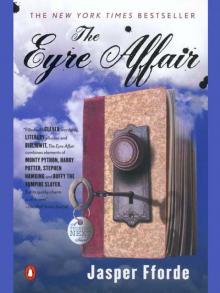 The Eyre Affair
The Eyre Affair The Eye of Zoltar
The Eye of Zoltar The Woman Who Died a Lot
The Woman Who Died a Lot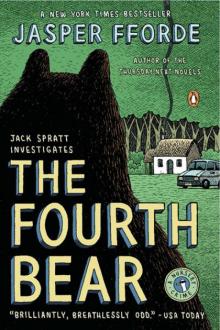 The Fourth Bear
The Fourth Bear Lost in a Good Book
Lost in a Good Book Something Rotten
Something Rotten The Well of Lost Plots
The Well of Lost Plots The Big Over Easy
The Big Over Easy The Constant Rabbit
The Constant Rabbit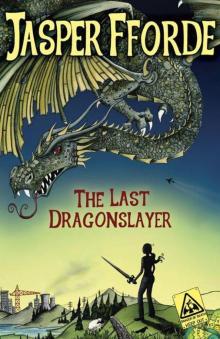 The Last Dragonslayer
The Last Dragonslayer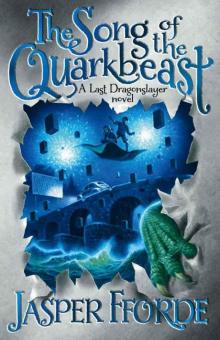 The Song of the Quarkbeast
The Song of the Quarkbeast One of Our Thursdays Is Missing
One of Our Thursdays Is Missing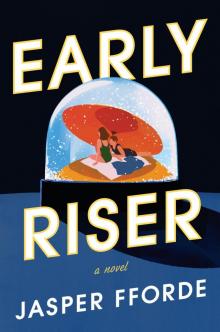 Early Riser
Early Riser Early Riser_The new standalone novel from the Number One bestselling author
Early Riser_The new standalone novel from the Number One bestselling author Something rotten n-4
Something rotten n-4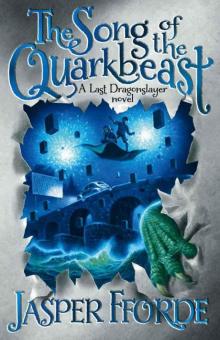 The Song of the Quarkbeast tld-2
The Song of the Quarkbeast tld-2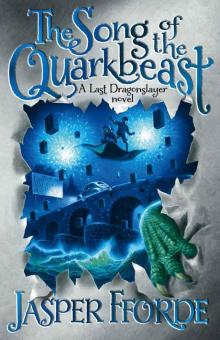 The Song of the Quarkbeast: Last Dragonslayer: Book Two
The Song of the Quarkbeast: Last Dragonslayer: Book Two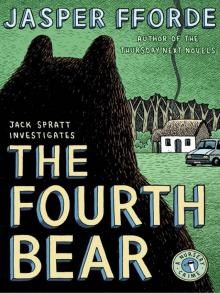 The Fourth Bear nc-2
The Fourth Bear nc-2 Lost in a Good Book tn-2
Lost in a Good Book tn-2 The Well of Lost Plots n-3
The Well of Lost Plots n-3 Thursday Next in First Among Sequels
Thursday Next in First Among Sequels First Among Sequels tn-5
First Among Sequels tn-5 The Eyre Affair tn-1
The Eyre Affair tn-1